ARTICLE AD BOX

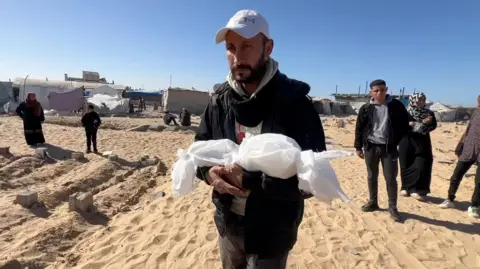 BBC
BBC
Sila's father carries her tiny body to be buried
Sila was less than three weeks old when her mother Nariman realised she wasn't moving.
"I woke up in the morning and told my husband that the baby hadn't stirred for a while. He uncovered her face and found her blue, biting her tongue, with blood coming out of her mouth," says Nariman al-Najmeh.
In their tent situated on the beach in southern Gaza, Nariman is sitting with her husband, Mahmoud Fasih, and their two young children - Rayan, who is four years old, and Nihad, who is two and a half.
The family say they have been displaced more than 10 times during the 14-month war.
"My husband is a fisherman, we're from the north and left without anything but we did it for our children," says Nariman in an interview with a freelance cameraman working with the BBC. Israel prevents international media from entering and freely working on the ground in Gaza.
"When I was pregnant, I used to think about how I was going to get clothes for the baby. I was really worried because my husband doesn't have work."

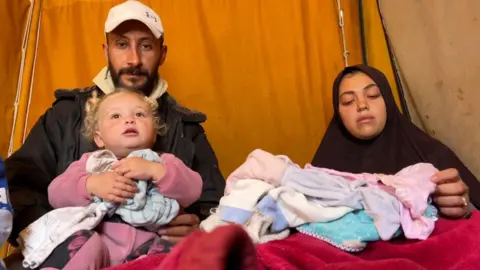
Sila's mother Nariman was worried about how she would provide for her baby throughout her pregnancy
During her 20 days of life, Sila's home was the small and overcrowded campsite in the al-Mawasi "humanitarian area", where hundreds of thousands of Palestinians displaced from elsewhere in the territory have been ordered to move by the Israeli military.
The area suffers from poor infrastructure and sanitation, as well as flooding caused by both rain and waves from the Mediterranean Sea.
"The cold is bitter and harsh. All night, because of the cold, we huddle together, curling up next to each other," says Sila's father, Mahmoud.
"Our life is hell. It's hell because of the effects of the war, my family was martyred, and our situation is unbearable."
Despite telling civilians to head to the area, the Israeli military has struck al-Mawasi repeatedly during its campaign against Hamas and other armed groups in Gaza.

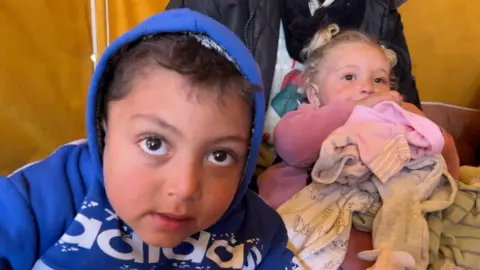
Sila had two older siblings, Rayan (left) and Nihad
Sila's death was not by bombardment - but still caused by the punishing conditions that the war is imposing upon civilians.
She is one of six newborns who have died from hypothermia within a two-week period in Gaza - where night-time temperatures have fallen to 7C (45F) - according to the local health authorities, who have also reported that many thousands of tents have been damaged by the weather.
Nariman says Sila was born at a British field hospital established in the Khan Younis area.
"After I gave birth... I started thinking about how I could secure her milk, nappies. Everything I got, I got with great difficulty."

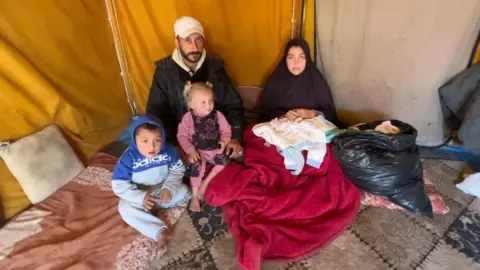
The family have been living in a leaking tent on the beach in southern Gaza
"I never thought I would give birth living in a tent, in such cold and freezing conditions, with water dripping on us. Water would leak into the tent, pouring down on us. At times, we had to run to escape the water - for the baby's sake," says Nariman.
Still, Sila was born without complications.
"Her health was good, thank God, Suddenly, she started to be affected by the cold," says Nariman. "I noticed she was sneezing and seemed to get sick from the cold, but I never expected she would die because of it."
Sila was admitted last Wednesday to Nasser hospital in Khan Younis, where Dr Ahmad al-Farra, the director of its paediatric department, said she had suffered from "severe hypothermia, leading to the cessation of vital signs, cardiac arrest, and eventually death".
"[On the previous day] as well, two cases were brought in: one was a three-day-old baby and the other was less than a month old. Both cases involved severe hypothermia, resulting in death," says Dr Farra.
Babies have an underdeveloped mechanism for maintaining their own body temperature and may develop hypothermia easily in a cold environment. Premature babies are especially vulnerable, and Dr Farra says Gaza's medics have observed an increase in the number of premature births during the war.
Mothers are also suffering from malnutrition, leaving to them unable to breastfeed their babies sufficiently. There is also a scarcity of infant formula because of humanitarian aid deliveries being restricted, according to Dr Farra.
Then on Sunday, another, tragic case.
Outside al-Aqsa hospital in central Gaza, a second local cameraman working with the BBC met Yehia al-Batran, who couldn't contain his anguish as he carried his dead baby son, Jumaa. Like Sila, he was also only 20 days old and was blue with cold.
"Touch him with your hand, he's frozen," said Yehia. "All eight of us, we don't have four blankets between us. What can I do? I see my children dying in front of me."
"These preventable deaths lay bare the desperate and deteriorating conditions facing families and children across Gaza," Unicef regional director Edouard Beigbeder said in a statement on Thursday.
"With temperatures expected to drop further in the coming days, it is tragically foreseeable that more children's lives will be lost to the inhumane conditions they are enduring."

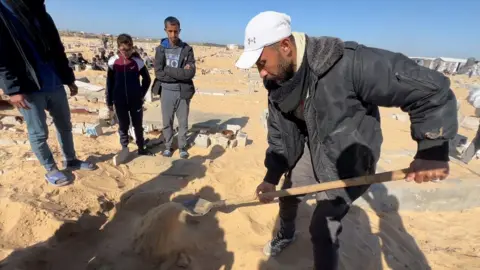
Mahmoud dug the grave for his newborn himself
Under the sound of Israeli drones flying ahead, Sila's father Mahmoud carried her lifeless body from Nasser hospital to a makeshift graveyard in Khan Younis. There, he dug a small grave in the sand.
After laying Sila to rest, Mahmoud comforted Nariman.
"Her siblings are sick, exhausted. We're all sick. Our chests hurt, and we have colds from the cold and rain," says Nariman. "If we don't die from the war, we're dying from the cold."

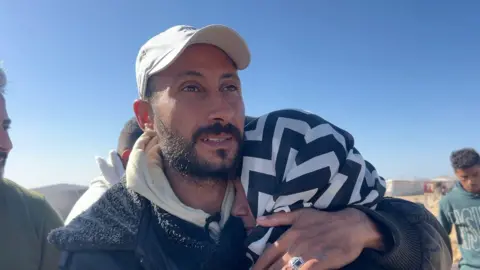
Mahmoud and Nariman say the family are exhausted and becoming ill

 2 weeks ago
7
2 weeks ago
7
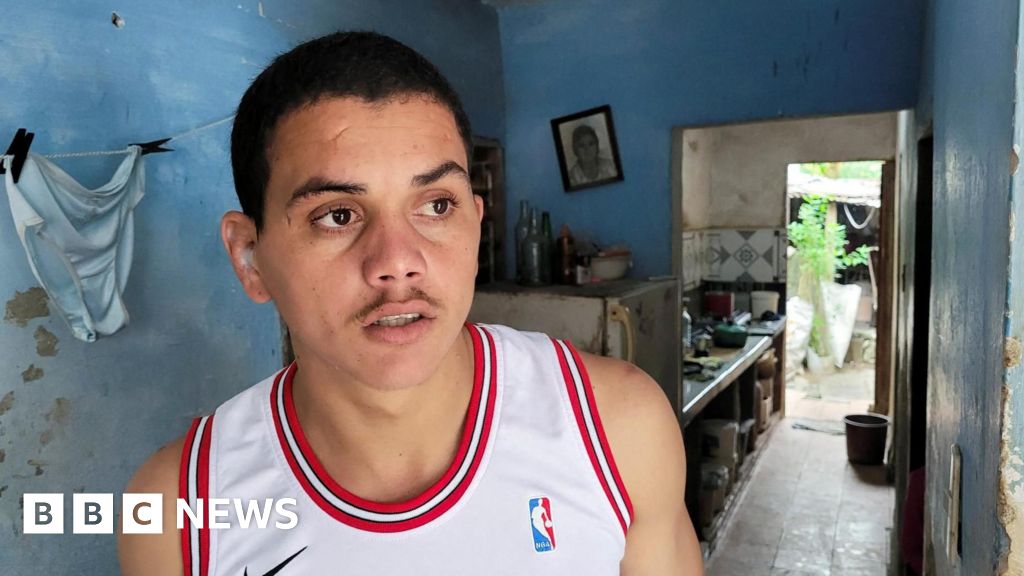
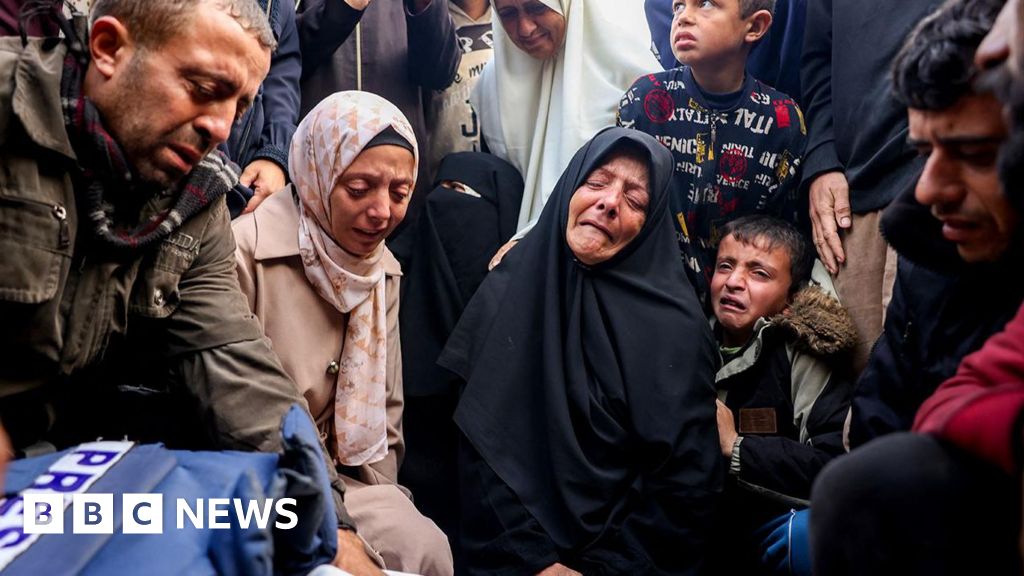
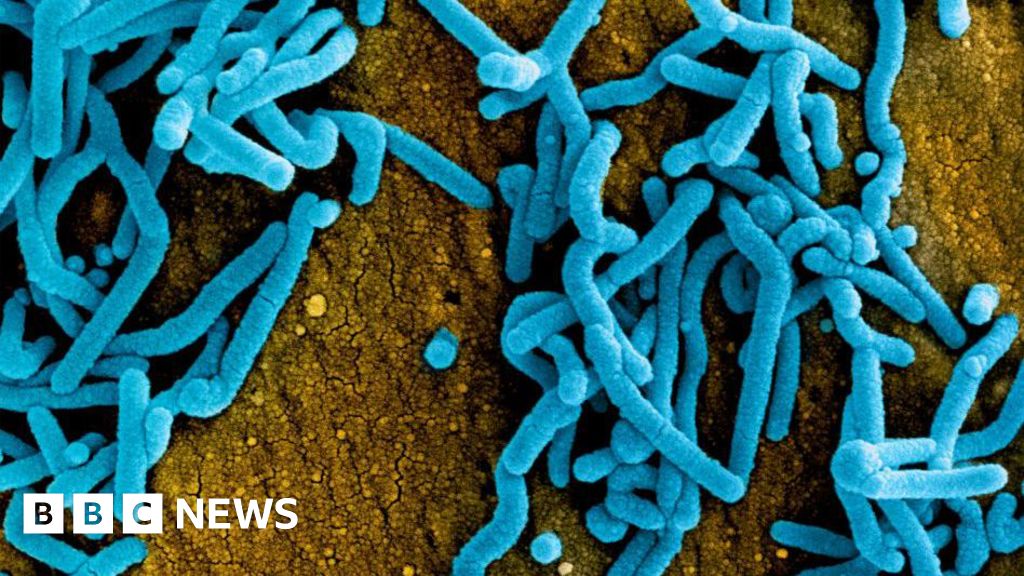





 English (US) ·
English (US) ·